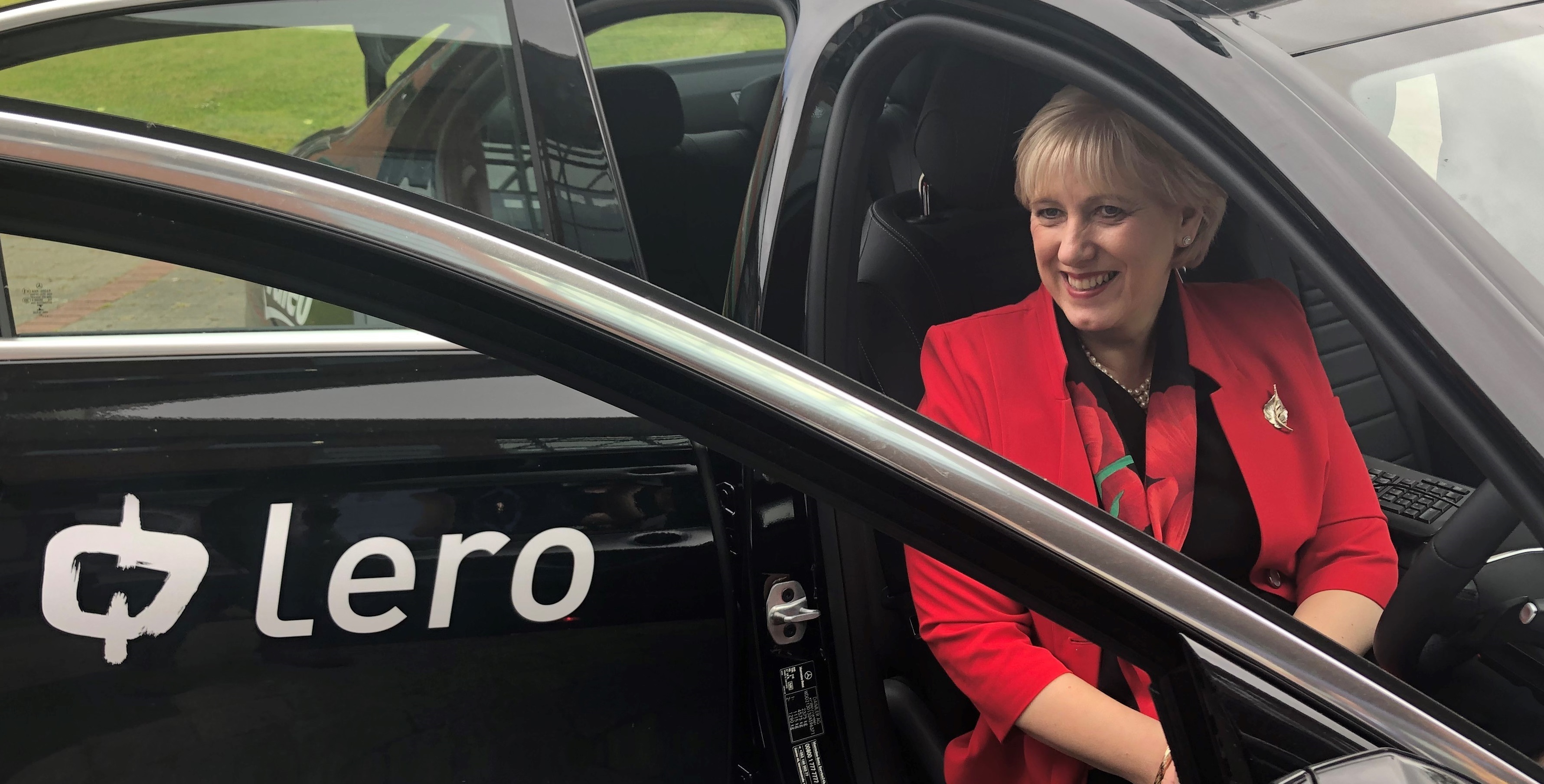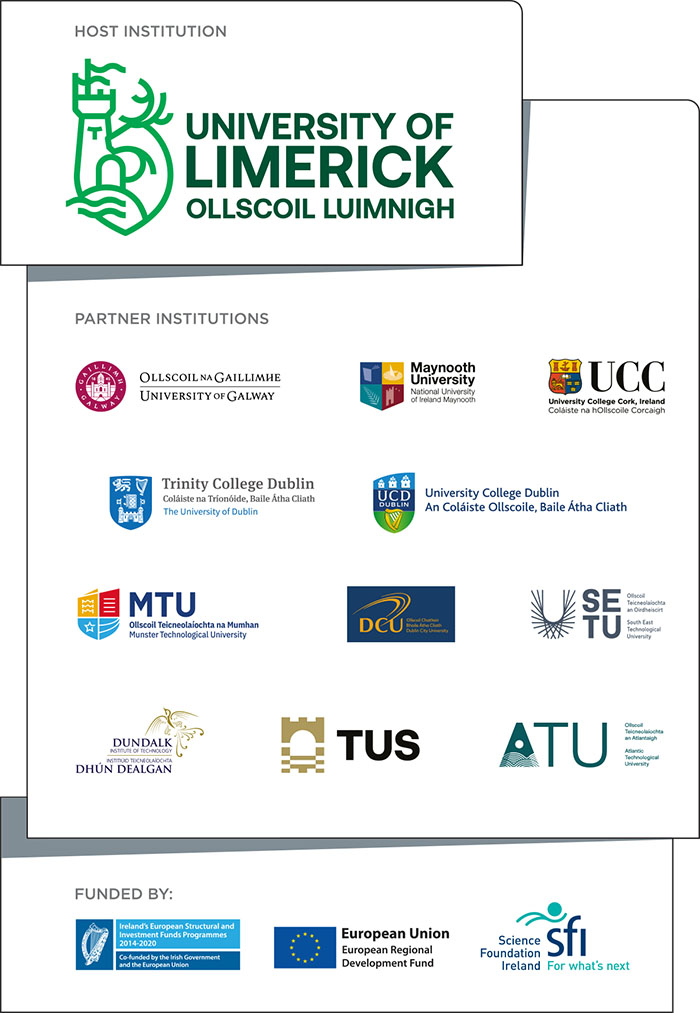Lero members highlight research to Ministers at innovation fund launch
You are here
Lero members highlighted their research to Ministers Heather Humphreys, TD, Minister for Business, Enterprise and Innovation, Paschal Donohoe, TD, Minister for Finance and Public Expenditure & Reform and Patrick O’Donovan, TD, Minister of State for Finance and Public Expenditure & Reform, at a flagship event on the impact of technological change on Irish businesses, held in University of Limerick recently.
The Ministers were in Limerick to launch Pillar 1 of the new Future Jobs Ireland plan which focuses on positioning Ireland as a leader in innovation and technology adoption. The Ministers also announced that another €100m was being made available under the Disruptive Technologies Innovation Fund for three-year projects to 2022. It is one of the first funds of its type in the world and a key driver of Pillar 1 of Future Jobs Ireland.

According to Minister Humphreys: “Pillar 1 of Future Jobs Ireland is about ensuring that Ireland can stay ahead of the game. We are currently experiencing a technological revolution, which will have a profound impact on our world for decades to come, and we need to keep up to speed.
“The Disruptive Technologies Innovation Fund is a key part of our efforts to prepare now for tomorrow’s world. The successful projects will be rooted in collaboration between industry and academia, with a clear focus on commercialisation. Crucially, they will have a transformative impact on how we work or live,” Minister Humphreys continued.
Minister Donohoe said: “The Disruptive Technologies Innovation Fund will provide opportunities for our most dynamic companies to translate their research into a commercial reality by working in partnership with Higher Education Institutions. Ireland needs to maintain its position as a technological leader in a modern, global economy. The investment that I and the Government have made available through this initiative for co-funded projects will help us to achieve that objective in the coming years.”
Projects must be geared towards commercialisation and are required to align with Ireland’s Research Priority Areas of ICT; Health and Wellbeing; Food; Energy; Climate Action and Sustainability; Manufacturing and Materials; and Business Services and Processes.
The Fund is competitive and will be assessed by an independent international panel of experts. It will drive enterprise collaborations involving firms of all sizes including a requirement for at least one SME in every consortium. It also encourages collaboration with Ireland’s world-class research base including universities and colleges.
Minister O’Donovan said: “The significant investments associated with the Disruptive Technologies Innovation Fund and the Future Jobs Ireland programme demonstrate our commitment to ensuring that Ireland remains among the global leaders in innovation”.
In order to ensure that projects of scale and impact are funded, the Disruptive Technologies Innovation Fund is available to applicants requesting funding of €1.5 million or more for projects of up to three years duration. Enterprise partners must provide matched funding.
The call for funding will be administered for the Department of Business, Enterprise and Innovation by Enterprise Ireland. Prospective applicants can obtain detailed information on the Fund and on the application process through the dbei.gov.ie/DTIF webpage. The application deadline is 15.00 Irish time on Wednesday, 18 September 2019.
€75m was allocated to 27 ground-breaking projects under the first round of the Disruptive Technologies Innovation Fund late last year, including two projects involving Lero, following 300 expressions of interest. Successful projects covered areas like household electricity generation, sepsis treatments, coastal flooding supports and medical 3D printing.
Holistic Human Sensing for Health, Aging and Wellness (HOLISTICS), a collaboration between Tyndall National Institute, SFI research centres Lero and Insight at University College Cork, DABL, PMD Solutions, De Royal, Setanta, Sanmina, Design Partners, VRAI, Henkel, ADI, and HRB CRF-C was awarded €7.4 million under the first round of the Disruptive Technologies Innovation Fund.
HOLISTICS will create for the first time in Ireland, a disruptive Smart Wearables Industry Value Chain to deliver end-to-end HealthTech solutions based on emerging human-centric intelligent sensors and their wireless communication to support new products.
A further €1.6 million was awarded to the Future Software Systems Architectures project, a collaboration between Lero at Dublin City University, fourTheorem and Fineos aimed at leveraging the internet network capability as a means to rapidly operationalise new software features.
Lero spinout Nova Leah at Dundalk Institute of Technology (DKIT) was granted €1.5 million for a Connected Medical Device Cybersecurity Transparency project. This project will use Artificial Intelligence, Data Analytics and Blockchain techniques to provide a real-time platform for the two-way communication of safety-critical security information between medical device manufacturers and hospitals.
Nova Leah and DKIT are also part of a consortium awarded €2.2 million to build a platform which can host, manage, process and analyse medical images and text data. The consortium also includes IBM Ireland, University College Dublin and Davra Networks Ltd.




